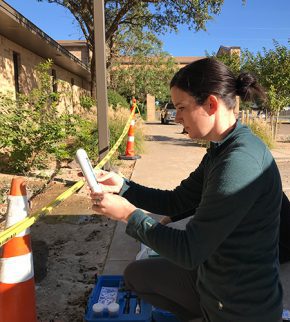Domestic Water, Sanitation, and Hygiene Epidemiology Team
The lead epidemiology unit for U.S. water-related disease in CDC’s National Center for Emerging and Zoonotic Infectious Diseases.
Mission: Tracking and investigating waterborne disease and outbreaks, building waterborne disease prevention capability in state and local health departments, and developing effective prevention strategies to improve health.

Administering in-person interviews during an investigation of a cryptosporidiosis outbreak linked to a municipal water supply in Oregon.

Conducting water quality testing at a municipal water sampling site in Texas during an outbreak investigation of a biofilm-associated pathogen.

Inspecting a cistern while providing post-hurricane assistance and investigating leptosporidiosis in the U.S. Virgin Islands.
Our Domestic Water, Sanitation, and Hygiene (WASH) Epidemiology Team works across seven areas:
- Outbreak, case, and wastewater surveillance
- Harmful algal bloom-associated illness tracking and prevention
- Hand hygiene
- Drinking water
- Recreational water
- Water-related emergency preparedness and response
- Pathogen-specific expertise, support, and disease tracking
- Free-living amebae (Naegleria fowleri, Balamuthia, and Acanthamoeba)
- Protozoan parasites (Cryptosporidium, Giardia)
- Shigella

Collecting a faucet water sample after administering an in-person interview in the home of a patient during an outbreak investigation.

Preparing to take large volume water samples during an investigation of a surf park.

Investigating well water during an outbreak of gastrointestinal illness among festival attendees at a camp in Pennsylvania.
Our team:
- Operates the Waterborne Disease and Outbreak Surveillance System
- Investigates outbreaks of waterborne disease by providing technical assistance for state and local partners
- Analyzes data to identify the causes, sources, and risk factors of waterborne disease and outbreaks and determine methods for control and prevention
- Gives state and local health departments training, resources, and consultation to build their capacity to detect, investigate, and prevent waterborne disease and outbreaks
- Develops estimates of the magnitude and health burden of waterborne disease in the U.S.
- Applies behavioral science theories and methods to inform prevention messaging
- Runs CDC’s Healthy Swimming Program
- Guides development of the Model Aquatic Health Code
- Provides guidance and tools for storing and treating drinking water and responding to water-related emergencies, disasters, and severe weather events
- Provides medical consultation and epidemiologic expertise related to free-living amebae
- Summarizes national data reported for cryptosporidiosis and giardiasis
- Promotes improved public health through education and communication

Assisting state partners in summarizing and discussing the status of an outbreak with CDC supervisors and subject matter experts over the phone.

Participating in a federal panel during a national symposium on harmful algae.

Participating in a Facebook Live event to promote healthy swimming messages.